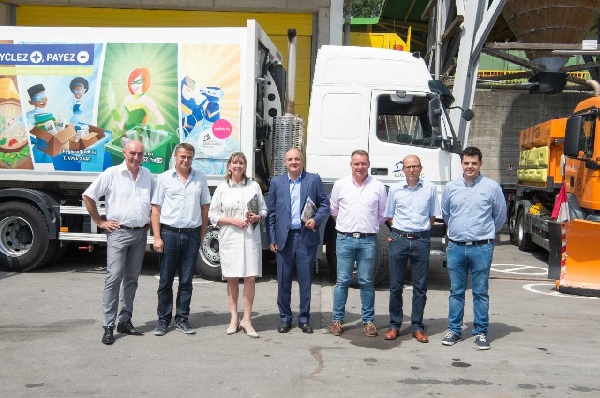
Last year, the Luxembourg Hygiene Service collected a total of 64,275 tonnes of waste, a slight decrease compared to 2016 (64,719 tonnes).
These figures were presented yesterday by Luxembourg City Mayor Lydie Polfer, Alderman for the environment Patrick Goldschmidt, Director of Energy and the Environment Nico Pundel and Head of the Hygiene Service Marc Weber, as part of the service's assessment for the year 2017.
The Hygiene Service, equipped with 340 employees and 135 vehicles, has been grouped together since 2014 under the Energy-Environment Department of the City of Luxembourg, together with the Water, Pipeline and Energy Services. It is responsible for cleanliness and waste management in the capital. This mission includes the daily cleaning of public spaces as well as after festivals and events. Its other main mission is the management and disposal of waste from individuals and professionals as well as offering many additional services and tasks, such as the management of the recycling centre and the management and maintenance of public lavatories without personnel.
Last year, the Hygiene Service collected 64,275 tonnes of waste, which is slightly less than the 64,719 tonnes collected in 2016, although the number of inhabitants of the capital continues to grow. This is a good sign and demonstrates the successful efforts made in terms of awareness and communication in order to avoid or reduce waste. From this amount, 26,754 tonnes of waste could be recycled, composted or subjected to various specific treatments, adding up to a recycling rate of 41.62%. This recycled matter consisted of 8,684.77 tonnes of paper and cardboard (28%), 5,120.44 tonnes of glass (19%), 2,861.58 tonnes of biodegradable waste (11%), 1,533.82 tonnes of wood (6% ) and 1,424.35 tonnes of PMC (5%)
Regarding the illegal dumping of waste, the City of Luxembourg currently has 57 public collection stations ("Igloos") where citizens can deposit glass, cardboard/paper, old clothes and batteries. These facilities are strategically distributed in the different neighborhoods so as to ensure proximity to users. Despite regular emptying of the containers, the Health Service had to remove some 444 tonnes (compared to 290 tonnes in 2016) of illegally dumped waste next to the igloos, generating a substantial cost for the capital. Four teams of two people had to be set up to work 7 days a week, dealing exclusively with the removal of such abandoned waste. In order to remedy this problem, the City of Luxembourg is trying both to reinforce its efforts to identify (and charge) the perpetrators of these incivilities and to raise public awareness through a campaign.
As for projects completed in 2017, the hygiene service hosted the "EKIPP" professional reintegration workshop offering adapted tasks for employees suffering from health problems who can no longer perform their usual tasks. These agents, from the City's various departments, carry out a wide range of work such as the cleaning of a new generation of sanitary blocks at the Skatepark.
Moreover, a customer assistance unit will be set up to support residents in their waste management in light of the 2012 law requiring residences to sort their waste. The new unit aims to provide them with a suitable device that is economically beneficial and complies with legal requirements. Likewise, a waste guide available in French, German and English, gathering all the instructions and information on the waste management of the City of Luxembourg was launched in 2017. Similarly, the Hygiene Service plans to launch an anti-littering campaign to raise awareness of this problem over an extended period.








